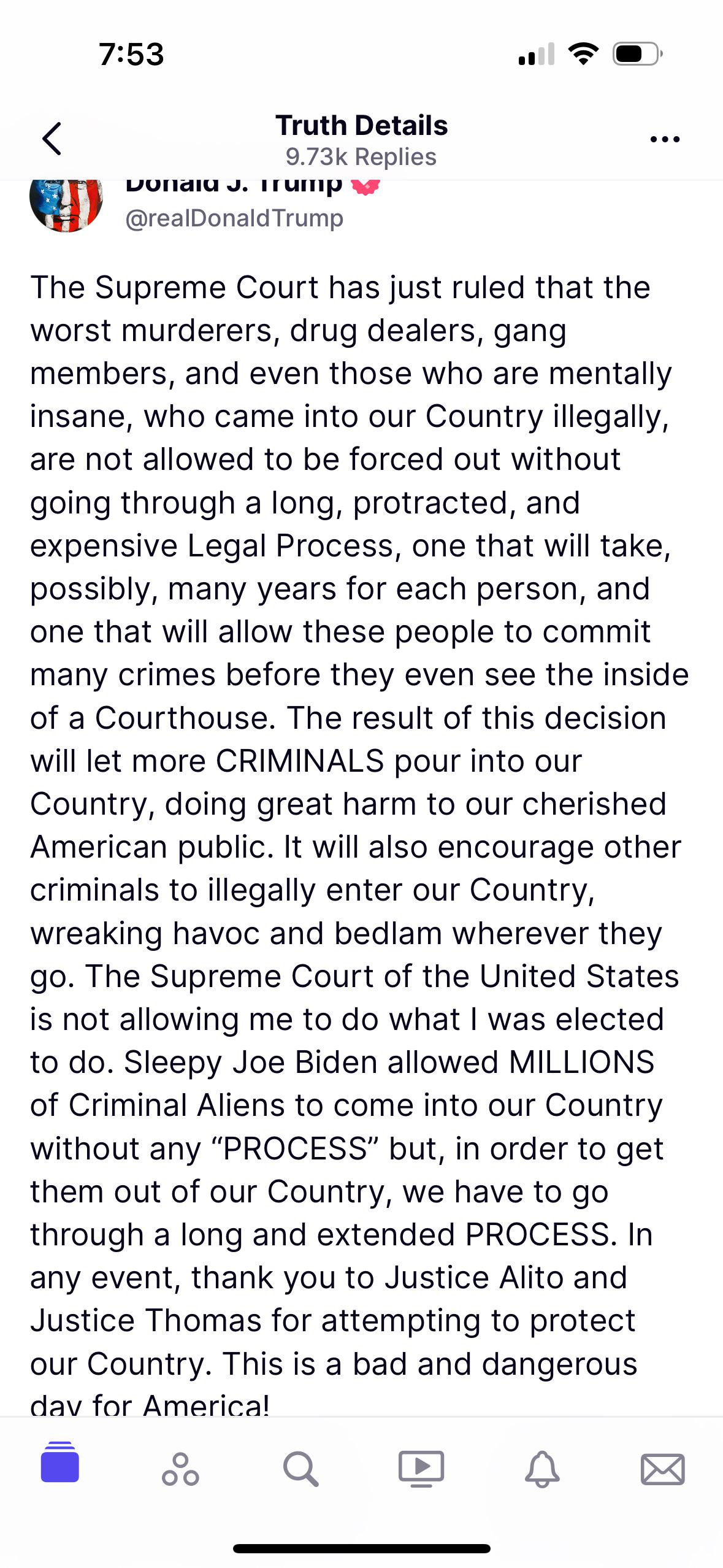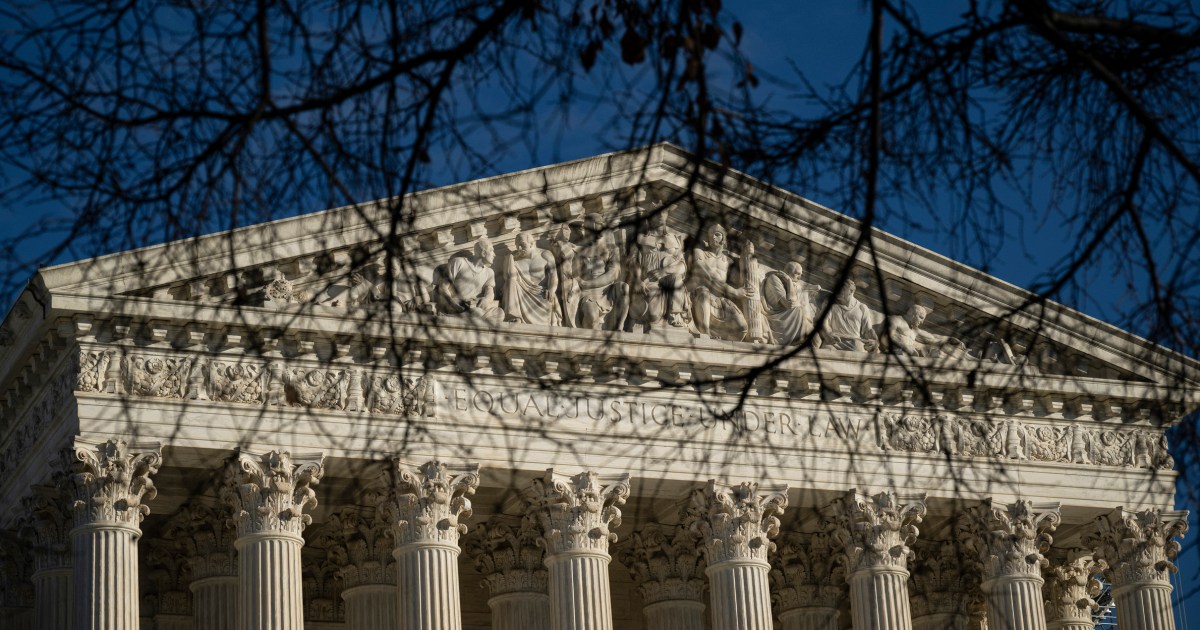Enumerating a Post-Dobbs Pathway
Balkinization
an unanticipated consequence of
Jack M. Balkin
Balkinization Symposiums: A Continuing List
E-mail:
Jack Balkin:
jackbalkin at yahoo.com
Bruce Ackerman
bruce.ackerman at yale.edu
Ian Ayres
ian.ayres at yale.edu
Corey Brettschneider
corey_brettschneider at brown.edu
Mary Dudziak
mary.l.dudziak at emory.edu
Joey Fishkin
joey.fishkin at gmail.com
Heather Gerken heather.gerken at yale.edu
Abbe Gluck abbe.gluck at yale.edu
Mark Graber
mgraber at law.umaryland.edu
Stephen Griffin
sgriffin at tulane.edu
Jonathan Hafetz
jonathan.hafetz at shu.edu
Jeremy Kessler
jkessler at law.columbia.edu
Andrew Koppelman
akoppelman at law.northwestern.edu
Marty Lederman
msl46 at law.georgetown.edu
Sanford Levinson
slevinson at law.utexas.edu
David Luban
david.luban at gmail.com
Gerard Magliocca
gmaglioc at iupui.edu
Jason Mazzone
mazzonej at illinois.edu
Linda McClain
lmcclain at bu.edu
John Mikhail
mikhail at law.georgetown.edu
Frank Pasquale
pasquale.frank at gmail.com
Nate Persily
npersily at gmail.com
Michael Stokes Paulsen
michaelstokespaulsen at gmail.com
Deborah Pearlstein
dpearlst at yu.edu
Rick Pildes
rick.pildes at nyu.edu
David Pozen
dpozen at law.columbia.edu
Richard Primus
raprimus at umich.edu
K. Sabeel Rahman
sabeel.rahman at brooklaw.edu
Alice Ristroph
alice.ristroph at shu.edu
Neil Siegel
siegel at law.duke.edu
David Super
david.super at law.georgetown.edu
Brian Tamanaha
btamanaha at wulaw.wustl.edu
Nelson Tebbe
nelson.tebbe at brooklaw.edu
Mark Tushnet
mtushnet at law.harvard.edu
Adam Winkler
winkler at ucla.edu
Compendium of posts on Hobby Lobby and related cases
The Anti-Torture Memos (arranged by topic)
Recent Posts
Wednesday, April 02, 2025
Enumerating a Post-Dobbs Pathway
Guest Blogger
For the Balkinization Symposium on Legal Pathways Beyond Dobbs.
Michael C. Dorf
For the foreseeable future, constitutional lawyers seeking progressive results from the federal courts will need to practice what I have called “ideological jujitsu—turning opponents’ strengths against them.” Nowhere is that more clear than in seeking to develop arguments that aim to restore rights to reproductive freedom and sex equality. This short essay articulates the benefits and potential pitfalls of one particular jujitsu maneuver: reliance on a sharp distinction recent cases draw between enumerated and unenumerated rights.
In New York State Rifle & Pistol Assn., Inc. v. Bruen, a 6-3 Supreme Court ruled in favor of challengers to New York’s firearms permitting regime because the state had failed to demonstrate that the challenged law was consistent with the history and tradition of firearms regulation at the Founding or during Reconstruction (or during other ostensibly relevant periods). Literally the very next day, in Dobbs v. Jackson Women’s Health Org., the same six Justices ruled against challengers to Mississippi’s ban on abortions after fifteen weeks’ gestation, on the ground (articulated in the majority opinion that spoke for five Justices) that the challengers had failed to demonstrate a history and tradition protecting a right to abortion at the Founding or during Reconstruction (or during other ostensibly relevant periods).
To a casual or cynical observer, the juxtaposition of the placement of the burden of persuasion in Bruen and Dobbs may look hypocritical and result-oriented: heads I win; tails you lose. And indeed, that perspective may well be accurate. But it is nonetheless possible to articulate a reason of principle—and not mere ideology—why proponents of gun rights do not bear the burden of persuasion but proponents of reproductive rights do bear such a burden.
The plaintiffs in Bruen relied on an enumerated right, so that once they established a prima facie exercise of that right, the issue in the case was whether the state could justify infringing the right. By contrast, the plaintiffs in Dobbs relied on an unenumerated right. Once an unenumerated right is established, the state has the burden of justifying its infringement. But to establish the right in the first place, those claiming it bear the burden of showing it to be deeply rooted in history and tradition. And Justice Alito’s opinion for the Dobbs Court contended that precedents establishing the abortion right were not merely wrong, but “egregiously wrong.”
We have very good reason to reject the enumerated/unenumerated dichotomy. For one thing, it directly contradicts the construction rule expressly stated in the Ninth Amendment. For another, it ignores the fact that even in cases involving enumerated rights, the constitutional text almost never expressly addresses the precise question at issue. Are campaign expenditures “speech” within the meaning of the First Amendment? Does the use of thermal imaging technology constitute a “search” within the meaning of the Fourth? The specific provisions of the Bill of Rights are not specific enough to mark a genuine distinction between enumerated and unenumerated rights.
However, the point of ideological jujitsu (as practiced by liberals like me) is to work within the conservatives’ premises and turn them towards liberal ends. Accordingly, I propose that to evade the history-and-tradition test, indeed, to turn it to our advantage, we could find a way to shoehorn putative rights like abortion or gender-affirming care into specific provisions of the Bill of Rights.
Free exercise of religion—as the seemingly most favored right of the Roberts Court—is a good place to start. Post-Dobbs, some Jewish groups have argued that very restrictive abortion bans violate their members’ free exercise rights because, under certain circumstances, Judaism requires abortion. State-level versions of the Religious Freedom Restoration Act (RFRA) offer another potential pathway to make that argument, as does the federal RFRA with respect to federal abortion restrictions. Indeed, case law construing the federal and state RFRAs often allows that a plaintiff states a claim even if religion is only a motive for their conduct. Thus, it is not necessary to show that Judaism (or some other religion) literally requires abortion in any circumstance; even if Judaism (or some other religion) merely permits abortion but is a source of values for a person choosing abortion, that may suffice.
The Fourth Amendment provides another potential avenue for grounding some aspects of reproductive and sexual autonomy. Conservatives have long mocked Justice Douglas’s march through the Bill of Rights in Griswold v. Connecticut for its invocation of penumbras and emanations, but the opinion’s discussion of the means necessary to enforce a ban on contraceptive use does resonate with Fourth Amendment values. A police search of what Justice Douglas called “the sacred precincts of marital bedrooms for telltale signs of the use of contraceptives” certainly seems, in the language of the Fourth Amendment, “unreasonable.”
To be sure, on issues with substantial culture-war salience, judges’ first-order values are likely to dominate implications from precedent or even any jurisprudential commitments implied by the opinions those very judges have previously authored or joined. That is why I am highly skeptical that we can make any headway with the Supreme Court by relying on the Equal Rights Amendment (ERA) as the 28th Amendment. Even assuming the Justices recognize the ERA’s ratification as valid, it is easy to imagine them invoking the dubious logic of Geduldig v. Aiello to hold that under the ERA, as under equal protection, laws targeting pregnancy do not count as discriminating on the basis of sex.
However, we need to start somewhere. As my reference to state RFRAs suggests, the Supreme Court is not the only venue in which to press arguments for reproductive and sexual freedom. Lower federal courts are another possible site, as are state legislatures and, of course public opinion. And we oughtn’t give up on the Supreme Court. Occasionally, even conservative Justices have liberal impulses. When that happens, we need to offer them conservative tools—such as textualist formalism in Bostock v. Clayton County—to get them where we want them to go. The distinction between enumerated and unenumerated rights has the potential to serve as another such tool.
Michael C. Dorf is Robert S. Stevens Professor of Law at Cornell Law School. You can reach him by e-mail at [email protected].
Books by Balkinization Bloggers
Linda C. McClain and Aziza Ahmed, The Routledge Companion to Gender and COVID-19 (Routledge, 2024)
David Pozen, The Constitution of the War on Drugs (Oxford University Press, 2024)
Jack M. Balkin, The Cycles of Constitutional Time (Oxford University Press, 2020)
Sanford Levinson and Jack M. Balkin, Democracy and Dysfunction (University of Chicago Press, 2019)
Brian Z. Tamanaha, A Realistic Theory of Law (Cambridge University Press 2017)
Balkinization Symposium on We the People, Volume 3: The Civil Rights Revolution
Joseph Fishkin, Bottlenecks: A New Theory of Equal Opportunity (Oxford University Press, 2014)
Mark A. Graber, A New Introduction to American Constitutionalism (Oxford University Press, 2013)
Stephen M. Griffin, Long Wars and the Constitution (Harvard University Press, 2013)
Balkinization Symposium on Ordered Liberty: Rights, Responsibilities, and Virtues
Andrew Koppelman, Defending American Religious Neutrality (Harvard University Press, 2013)
Brian Z. Tamanaha, Failing Law Schools (University of Chicago Press, 2012)
Mary Dudziak, War Time: An Idea, Its History, Its Consequences (Oxford University Press, 2012)
Jack M. Balkin, Living Originalism (Harvard University Press, 2011)
Richard W. Garnett and Andrew Koppelman, First Amendment Stories, (Foundation Press 2011)
Bruce Ackerman, The Decline and Fall of the American Republic (Harvard University Press, 2010)
Balkinization Symposium on The Decline and Fall of the American Republic
Mark Tushnet, Why the Constitution Matters (Yale University Press 2010)
Jack M. Balkin and Reva B. Siegel, The Constitution in 2020 (Oxford University Press 2009)
David Luban, Legal Ethics and Human Dignity (Cambridge Univ. Press 2007)
Ian Ayres, Super Crunchers: Why Thinking-By-Numbers is the New Way to be Smart (Bantam 2007)
Brian Tamanaha, Law as a Means to an End (Cambridge University Press 2006)
Sanford Levinson, Our Undemocratic Constitution (Oxford University Press 2006)
Mark Graber, Dred Scott and the Problem of Constitutional Evil (Cambridge University Press 2006)
Jack M. Balkin, ed., What Roe v. Wade Should Have Said (N.Y.U. Press 2005)
Sanford Levinson, ed., Torture: A Collection (Oxford University Press 2004)
Balkin.com homepage
Bibliography
Conlaw.net
Cultural Software
Writings
Opeds
The Information Society Project
BrownvBoard.com
Useful Links
Syllabi and Exams

















































.jpg)




















